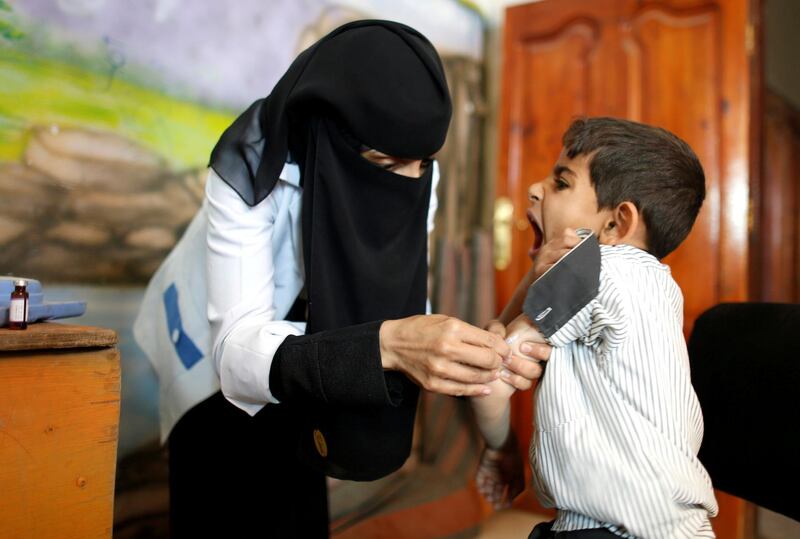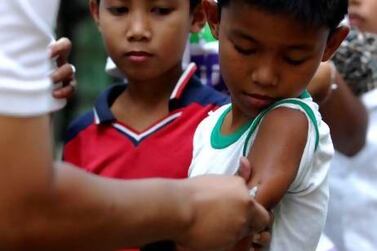Parents are being warned of a global surge in measles cases that could put unprotected children at risk ahead of the busy Christmas travel period.
So far this year, America has reported its highest number of cases in 25 years, while four European nations lost their measles elimination status after new outbreaks.
Protracted illnesses were reported in the UK, Albania, the Czech Republic and Greece in 2018, with a total of 140,000 measles deaths reported worldwide.
Unvaccinated children in Samoa are the latest victims of a disease outbreak, where the death toll has soared past 50.
“The fact that any child dies from a vaccine-preventable disease like measles is frankly an outrage and a collective failure to protect the world’s most vulnerable children,” said Dr Tedros Ghebreysus, director general of the World Health Organisation.
“To save lives, we must ensure everyone can benefit from vaccines - which means investing in immunisation and quality health care as a right for all.”
The UAE government mandates vaccinations to children from birth to the time they reach grade 11, typically age 16.
A measles, mumps and rubella jab is one of 14 vaccinations offered to children to guard from potential disease outbreaks.
According to the World Health Organisation, vaccine uptake in children is high in the Emirates due to the national in-school vaccination programme.
Figures from 2018 state more than 95 per cent of children are protected against measles in the UAE, within the organisation's recommendations.
“Vaccinations are generally safe but there are some myths about vaccinations, especially MMR,” said Dr Wael Mohamed, paediatrics specialistat NMC Royal Hospital, Abu Dhabi.
“They undergo many trials and tests before being made available for human use.
“Reported MMR links to autism are untrue and have been proved beyond doubt.
“Unfortunately, as a result of this anxiety there has been a reduction in vaccination uptake and we are now seeing a global breakthrough in nations where measles was once controlled.”
Most measles deaths are among children under five.
Babies and very young children are at greatest risk from infections, with potential complications including pneumonia and encephalitis, which results in a swelling of the brain.
This can lead to a lifelong disability such as permanent brain damage, blindness or hearing loss.
The World Health Organisation and Unicef estimate 86 per cent of children globally received the first dose of measles vaccine through their country’s routine vaccination services in 2018.
Fewer than 70 per cent received the second recommended dose.
Experts warn current worldwide coverage of measles vaccination is not adequate to prevent outbreaks.
“It is a tragedy that the world is seeing a rapid increase in cases and deaths from a disease that is easily preventable with a vaccine,” said Dr Seth Berkley, chief executive of Gavi, the Vaccine Alliance.
“While hesitancy and complacency are challenges to overcome, the largest measles outbreaks have hit countries with weak routine immunisation and health systems.
“We must do better at reaching the most vulnerable.”
Since 2001, measles vaccination alone is estimated to have saved more than 23 million lives.
Global protection rates have stagnated for almost a decade, partly due to mis-information on the side effects of vaccines circulated on social media.
A growing number of parents refusing to vaccinate their children has led to a resurgence of vaccine preventable diseases.
In 2010, the US state of California recorded 9,120 cases of whooping cough, more than in any other year since the 1940s.
It is a condition preventable by the Diphtheria, Pertussis and Tetanus (DPT) jab, one of the mandatory vaccines given to children in the UAE.
Estimating the total number of cases and deaths globally, the latest Unicef and World Health Organisation report found the worst impacts of measles were in sub-Saharan Africa.
There, many children have persistently missed out on vaccination.
In 2018, nations with the highest incidence rate of the disease were Democratic Republic of the Congo (DRC), Liberia, Madagascar, Somalia and Ukraine.
These five countries accounted for almost half of all measles cases worldwide.
“We’ve had a safe and effective measles vaccine for over 50 years,” said Dr Robert Linkins, chairman of the Measles & Rubella Initiative at the US Centres for Disease Control and Prevention.
“These estimates remind us that every child, everywhere needs this life-saving vaccine. “We must turn this trend around and stop these preventable deaths by improving measles vaccine access and coverage.”








